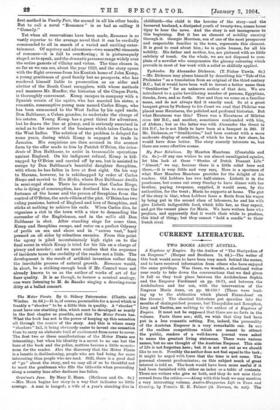IT is highly necessary in attempting to appraise Mr. Conrad's
work to distinguish between the various forms in which it appears. There is, first, the Mr. Conrad who writes, and writes in inimitable fashion, about the Malay Archipelago and the dark places of Africa ; then there is the Mr. Conrad who writes far less convincingly of life in England ; and lastly, there is the Mr. Conrad who collaborates with Mr. Hueffer. Nothing is more difficult or more invidious than to deal justly with a partnership between writers who are in point of achievement and equipment unequally matched. And the difficulty is all the greater when they do not habitually hunt in couples, and it is consequently possible to compare work done in association with that done independently. From the test of comparison with Youth, Lord Jim, or Typhoon the present volume cannot honestly be said to emerge with distinction, exciting and brilliant and im- mensely superior to The Inheritors—the previous outcome of their partnership—though it undoubtedly is. Mr. Conrad is a writer of remarkable and original powers, quite un- equalled in the interpretation of certain phases of Oriental character and the presentation of certain seafaring types, to say nothing of his real distinction of style and extraordinary sense of the picturesque. In so far, there- fore, as these qualities are kept in abeyance, or impaired by his association with another writer, it is impossible to avoid holding his partner responsible ; nor need one be surprised at the result. You cannot harness genius with talent. This disparity of temperament and dissimilarity of outlook are reflected in the style, which is far from homogeneous, in the structure of the story and the treat- ment of various episodes. Nothing, again, could have been less judicious than the title, at once bald and pretentious. The title of a novel should either be alluring and suggestive, or a plain but workmanlike label. Tbackeray adopted the • Romance. By Joseph Conrad and Ford Madox Huoilor. London z Smith, Elder, and Co. Les.] first method in Vanity Fair, the second in all his other books. But to call a novel " Romance " is as bad as calling it " Comedy."
Yet when all reservations have been made, Romance is so vastly superior to the average novel that it can be cordially
commended to all in search of a varied and exciting enter- tainment. Of mystery and adventure—two essential elements of romance—it is full to overflowing; it is picturesquely
staged, so to speak, and the dramatis personae range widely over the entire gamuts of villainy and virtue. The time chosen is, so far as we can see, about the year 1820, and the story opens with the flight overseas from his Kentish home of John Kemp, a young gentleman of good family but no prospects, who has rendered himself liable to prosecution as an eider and abettor of the South Coast smugglers, with whose methods and manners Mr. Hueffer, the historian of the Cinque Ports, is thoroughly conversant. Kemp escapes in company with a Spanish cousin of the squire, who has married his sister, a romantic, consumptive young man named Carlos Riego, who has been summoned to the West Indies by his aged uncle, Don Balthasar, a Cuban grandee, to undertake the charge of his estates. Young Kemp has a great thirst for adventure, but he draws the line at piracy, and is seriously exercised in mind as to the nature of the business which takes Carlos to the West Indies. The solution of the problem is delayed for some years, during which Kemp is engaged in trade in Jamaica. His suspicions are then aroused in the acutest form by the offer made to him by Patrick O'Brien, the inten- dente of Don Balthasar, to assist in treasonable operations against England. On his indignant refusal, Kemp is kid- napped by O'Brien and carried off by sea, but is assisted to escape by Don Balthasar's beautiful daughter Seraphina, with whom he has fallen in love at first sight. On his way to Havana, however, he is rekidnapped by order of Carlos Riego and carried to Rio Medio, where Don Balthasar dwells in semi-regal state. There he discovers that Carlos Riego, who is dying of consumption, has destined him to rescue the fortunes of the house and the person of Seraphina from the control of O'Brien, the arch-villain of the plot. O'Brien has two ruling passions, hatred of England and love of Seraphim, and sticks at nothing to achieve his ends. When Carlos dies, he organises a riot in the town with a view to demanding the surrender of the Englishman, and in the mage old Don Balthasar is shot. After standing siege for some time, Kemp and Seraphina escape, and enter on a perfect Odyssey of perils on sea and shore and in " antres vast," hard pressed on all sides by relentless enemies. From this point the agony is piled mountainously high right on to the final scene in which Kemp is tried for his life on a charge of piracy and murder ; and we must confess that the sequence of incidents taxes the credulity of the reader not a little. The development is the result of artificial invention rather than the inevitable process of natural growth. Romance would, in short, be a striking enough book if Mr. Conrad were not already known to us as the author of works of art of far finer quality. It is as though, to borrow a musical analogy, one were listening to M. de Reszke singing a drawing-room ditty at a ballad concert.















































 Previous page
Previous page